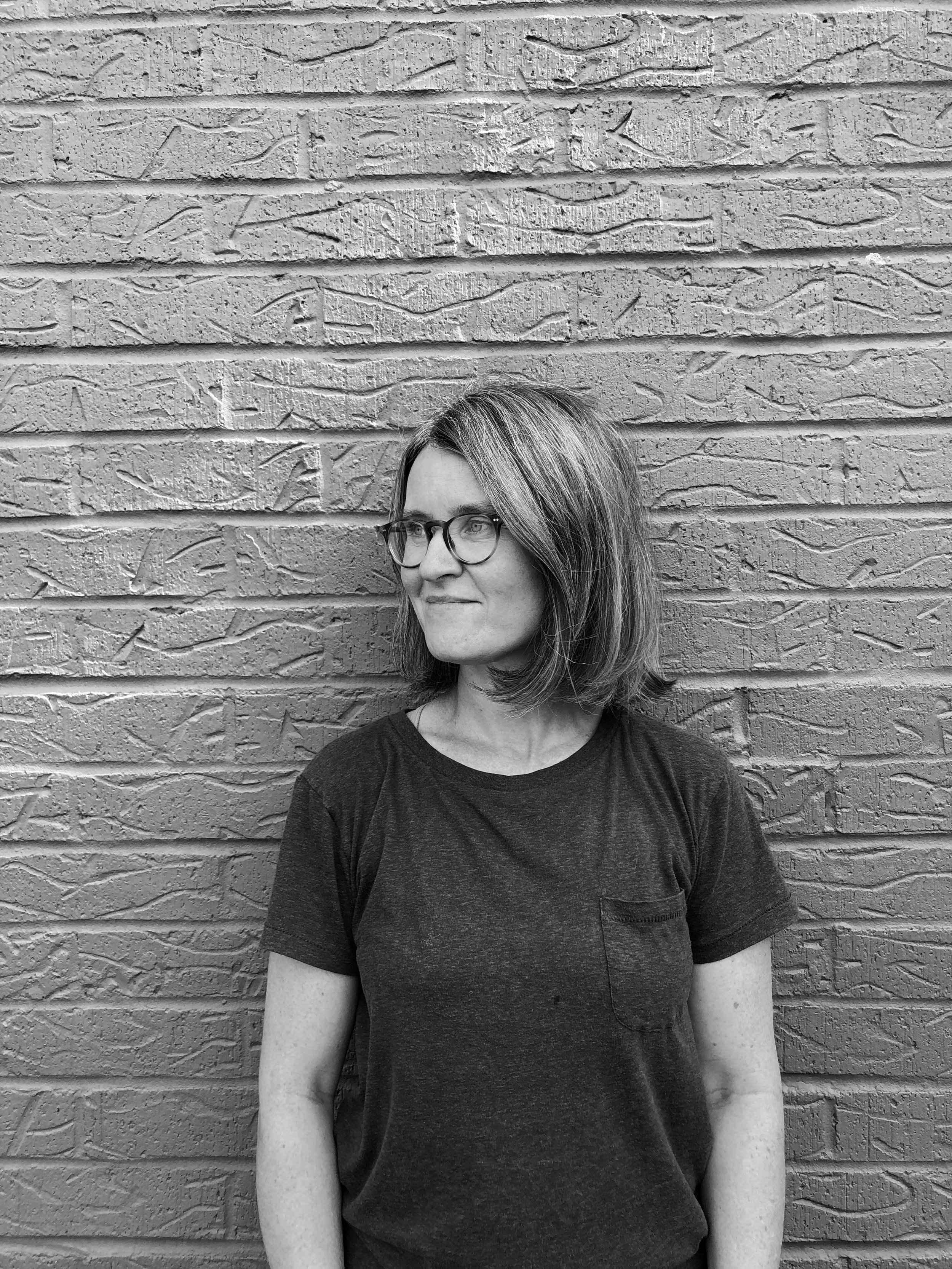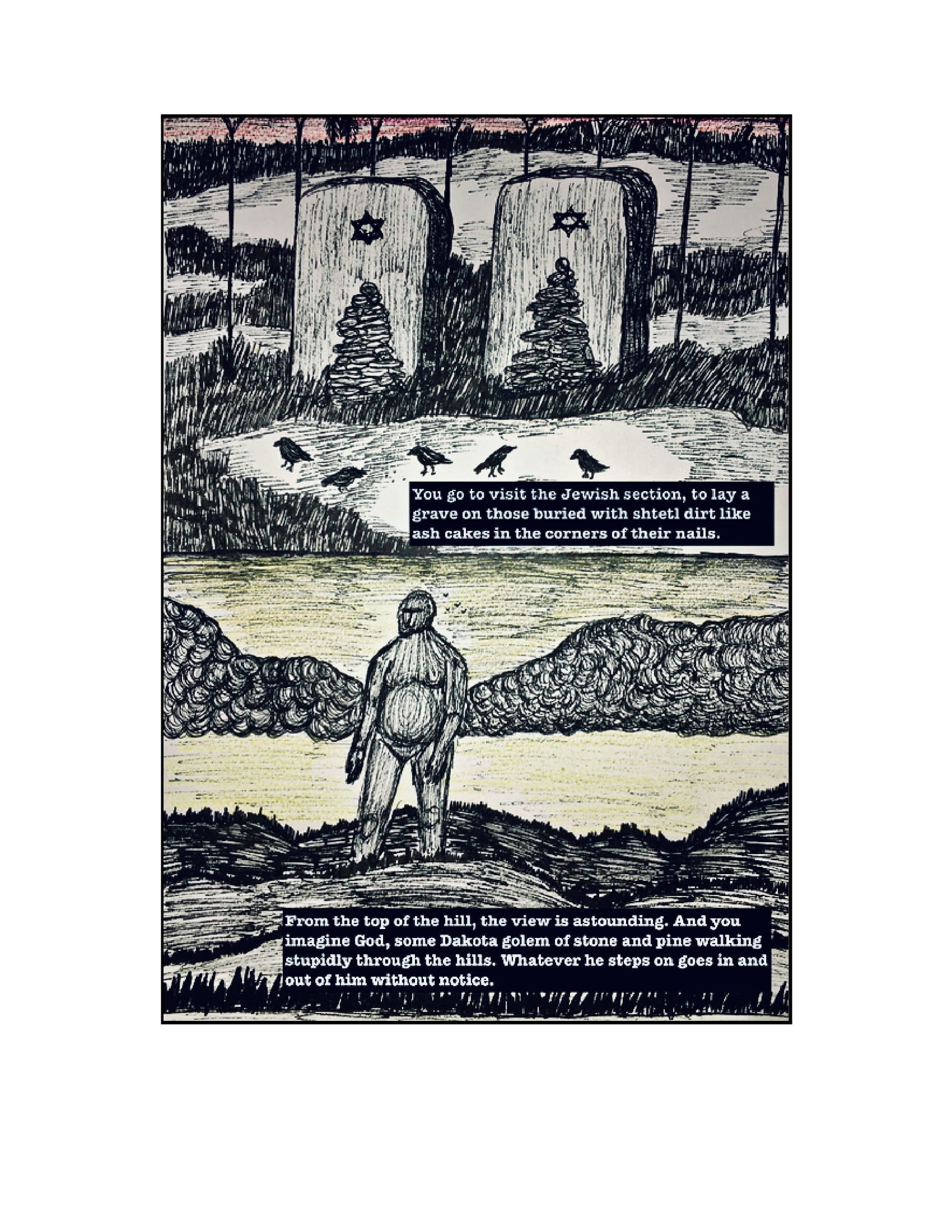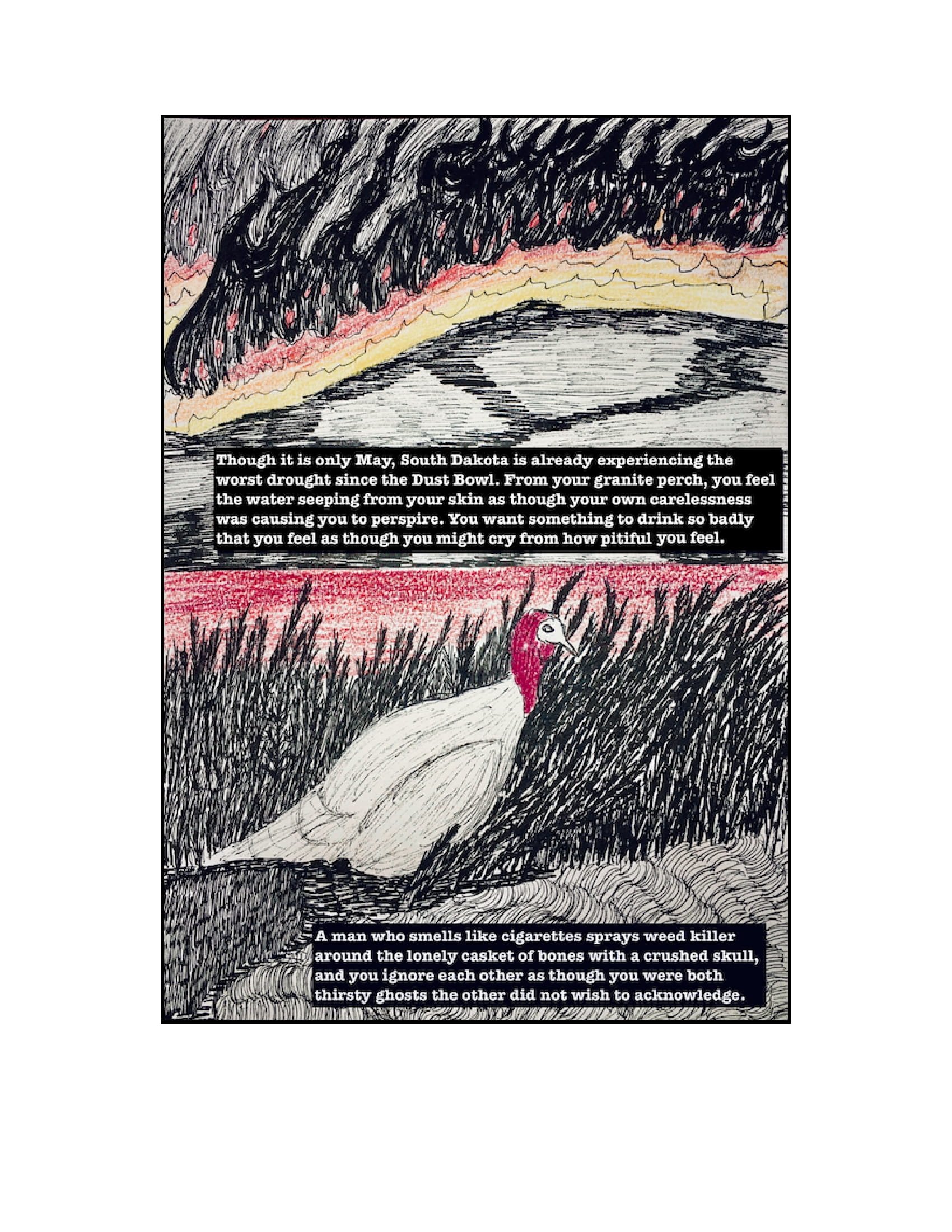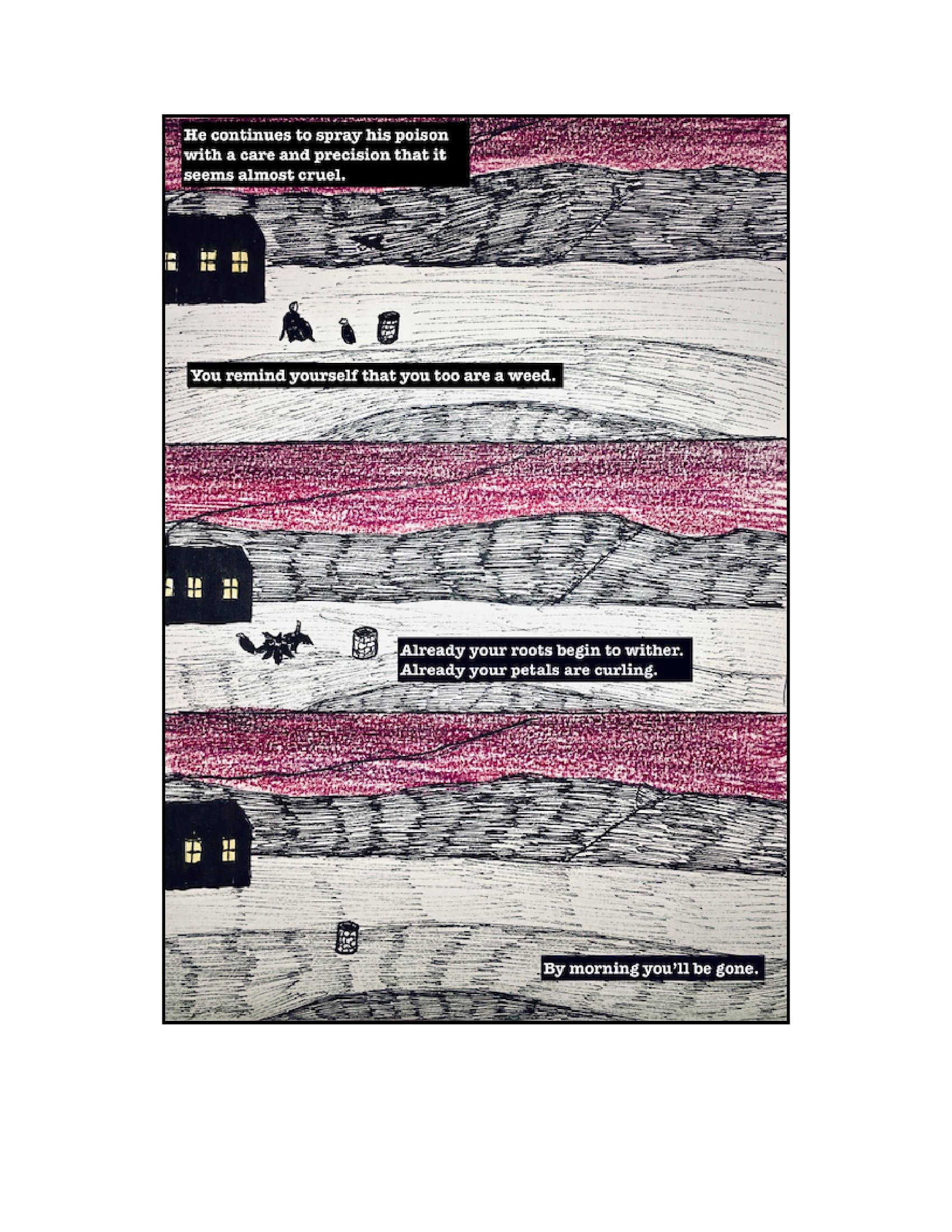by Caite McNeil
“This is a story born of regret over lost time and temporary loss of self. It is a travel narrative of the speculative sort, where the narrator imagines her way away from the pain and dysfunction of her reality.”
M is on his fifth IPA and he’s sullen drunk, brooding. His business, a surf shop in a tiny, well-heeled North Shore town, is failing and he is sure I’m cheating on him. He watches me from the corner of the couch. On the coffee table are the dahlias we stole from our landlord’s garden. That was weeks ago. Today they shed their browning petals and slump. So heavy, those Fibonacci spirals, that ridiculous, mathematical beauty. M’s hair is long and salty, framing his long salty face, and there’s wanting and hate and desperation in his eyes.
“Where are you going?” he asks when he hears me opening and closing my top dresser drawer that sticks. For a run, I say, while I work my hair into a tight ponytail. I don’t love you anymore, I add, then I take the spiral stairs out of the carriage house, and haul out of the town where we live but don’t belong. Past the landscapers and their droning leaf blowers. Past the beach where my students splash, laze and eat sticky snack-shack fare. Past the yacht club where I picked up some shifts, evenings and weekends, serving gin and tonics to men in shorts, laughing at their jokes and enduring their leers. This after teaching fifth grade all day, all week. Let’s write a simile, kids. You finish this sentence: She ran like a_____.
My family, my friends, they’re all to the north, but I can’t call on them now. I’m too far gone, and there’s a warm southerly wind beckoning. To get where I’m going, I must pass M’s surf shop, where one of his teenage groupies slouches behind the counter, watching stylized 1960s surf porn on a mounted flatscreen. Was that his boss’s girlfriend running by? Or a momentary eclipse of the sun? I am a flicker of light outside the shop window, and by the time my shadow recedes, I am blocks away. It’s my school that I pass next, just as a late basketball practice lets out. Coach Peters does a double take in my direction, but all he gets is a faint memory of somebody’s pale, bouncing ponytail. I am gone, out of town, before I was ever there.
Born in a south-facing house on the banks of a river flowing due east, I am easily oriented, and it’s easy enough to keep the ocean in my left hand, a bit of seagrass in my right. Hemming New England’s coast are sidewalks, backroads, bike-lanes, deer paths, beach paths, freeways, runways, cobblestoned one-ways, and private ways. But none of that matters. Nothing tires me, and I am too swift for even the long legs of private property laws to catch. Once I’m out of New England, folks don’t much mind my running through their grass or along their beaches. I’m low impact and there’s no funny business. I don’t want to fish or sunbathe. I’m not interested in their boats or private boardwalks. Security cameras might capture me as a beam from a headlight, a gust of dusty wind. Dogs will sometimes follow me for a stretch of road, not out of malice, but compulsion. They too were born for this. Their company is nice, to hear their panting, their doubled footfalls, the jangling of tags on collars. Otherwise, I am alone. Settling into my breath, a jaunty, allegro played in 4/4 measure.
There’s a spot far out on the Delaware Bay where the houses dress like mothers of the bride--all turrets and gables, cupolas, and gold filagree--and the land comes to an abrupt end. Bells sound from the grey clapboarded church named for Saint Agnes, and the front doors open, spilling forth Pachelbel and applause. A bride flies through the open doors, her veil and train ablaze, and heads straight for the ocean. It’s sandalwood and burning silk I smell as she rushes past me. “Oh God, oh God, oh God,” she says, her voice shallow and staccato. I cannot see her face behind the conflagration of her veil but can imagine her eyes: wide and scanning. My hand, the left one, outstretched in a gesture of aid that comes to me too late, is singed by a jumping cinder. The burning lace wraps around the base of my second, the ring finger, and I clutch it to my breast, embarrassed by my proximity, branded by my complicity.
Chattering guests duck through the sacramental sprinkling of rice and paper confetti, and bat at their smoldering sleeves, their wrists weak, as though swatting at flies. Bride-shaped steam rises over a hedge of Ragusa roses and Pachelbel’s three violins climb and weave and congratulate each other’s finger work. In the driver’s seat of a borrowed convertible, the groom waits for his bride to collect herself before they speed off up the road to the Howard Johnson. The band is already playing Beach Boys hits. The ice sculptures melt. And I’m off running again, like a runaway bride with a weeping wound where a wedding band could have been, might have been.
Weddings were never good for M and me. The tension was in the silent conjectures of others. His parents: How long before they’re married? My parents, everyone else: How long before she leaves him? The last wedding, my best friend’s, he seethed all night, shooting me death glares while I played beer pong with the bride. I heard him laughing a high-pitched, mocking laugh from across the room when I joined in the singing at an acoustic guitar circle. They were folk songs, mostly, from our parents’ era.
“Your friends are fucking snobs,” he said when it was time to sleep in our dorm room.
The groom was a Harvard man, so he never stood a chance with M. And the wedding was at the boarding school where my best friend and I met.
“You all think your shit don’t stink. You think you’re so fucking special.”
This Land is Your Land was on loop in my head, which was swimmy from beer and grasping at some kind of refrain to settle me. The room was dark but for the red illuminated emergency exit sign, and our yelling was hushed, but full of bodily effort. This land is my land. He chased me around the dark, fumbling over heavy oak desk chairs, and threw me onto the unmade twin bed. From California, to the New York Island. Pinned to a mattress that crinkled and stuck to my sweaty back, I weighed foreplay against fear. From the Redwood Forest, to the Gulf Stream waters. After some time in a headlock, I broke free and ran out the only door, the emergency exit.
My blows were verbal, and cut absolutely to his weak, sad soul. His blows, verbal, sometimes physical, only wounded my soul, but I swear he could have killed me in that dark, red dorm room while Woody Guthrie watched from some tall mountain, shaking his head in disappointment.
Long about Virginia, I grow thirsty, my skin parched, freckled thirsty for mountain air, a stream baptism. Mountain music plays in the west, and I say farewell for now to the sea breeze that called me forth. Mountain paths are slower going. My feet stumble on roots, my legs ache from elevation gain, but afternoon rains fill my coffers, turn paths to streams, offer respite for sore muscles, offer drink to belly, breasts, shoulders, throat and brow. Primordial, these trees, these woods, this forest floor. Profound this mossy ground. And the fiddle ascends, descends, and the banjo plucks an age-old tale, and I’m sleepy and ready to give myself over to the ballad. It’s a duet, sung by pines and the ghosts of chestnut trees, their voices resigned, prophetic:
Oh Willie, oh Willie, I'm a feared for my life-
Oh Willie, oh Willie, I'm a feared for my life-
I'm afraid you mean to murder me, and leave me behind.
Pretty Polly, Pretty Polly, you guessed about right-
Polly, Pretty Polly, you guessed about right-
I've been diggin' your grave, for the best part of last night.
Limbs heavy, ground soft, I’m sinking, swallowed up by the bosom of the mountain, and just as I permit my body to rest, my eyes to close, I feel a nudging at my cheek. The warm lapping of a rough tongue. A heavy kneading of my chest and belly. Mama? I say, and I am moved to tell her everything, as if freed by a fever dream. She lifts me by the flesh of my neck, and breaks the skin, not because she lacks tenderness, no, I am different from her other babies. Easier to pierce, slower, less nimble. I cannot speak, nor can I stay. The male cougar is near, is hungry and less abetting of the weak. My scent is too strong, too easy to track, so she nudges me on toward a riverbank. Swim, she commands with her yellow, slitted eyes. And I do.
At the confluence of the Mississippi, Red, and Atchafalaya rivers, where cyprus and tupelo grow out of standing water and drape themselves in veils of moss, a young woman approaches by airboat. I’m standing in ankle deep swamp, the rivers’ swirling movements disorient me.
“You need some help, hun?” she hollers, pulling her boat astride me in the shallows. A sign on its side spells “Airboat Tours” in black, hand-stenciled spray paint. She must yell for the motor, the fan of her boat, and her voice is polloped from daily strain and cigarettes. Those, the cigarettes, are packed safely in a Ziplock bag and duct taped to the side of her captain’s chair.
“There’s all kinds of snakes and gators here, hun. Hop in. I’ll take you somewhere?” She kills the motor then reaches over the side of her boat to help me aboard. Her forearms are strong and sinewy, her shoulders tanned deep, her hair, peroxide blonde, is dark at its roots and sticks to her neck. “Sorry there is no room to sit, sweetie. It’s my boyfriend’s boat. He’s a goddamn slob,” she says, clearing from the boat’s benches fishing poles and lines, faded kiddie life jackets, unmarked cardboard boxes.
“You one of them environmentalists trying to shut us down for noise pollution?” she asks with her back to me while her shaky hands make work of untangling, respooling invisible fishing wire. “I don’t really care if you are. It ain’t my gig anyway, it’s my boyfriend’s.” She tosses the still-tangled wire into a cardboard box and reaches for her cigarettes. “And he’s a fucking deadbeat.” Two shaky flicks of the lighter and it’s lit. She’s quiet for the first few drags, her mouth a rectangular grimace, her face scanning the sky.
The nicotine seems to calm her shakes, seems to help her think. Big black sunglasses obscure her eyes, but I’m certain she’s looking past me. Judging the currents, probably. “You got a boyfriend, hun?” The boat drifts, does a slow half turn. “Ehhh, you’re better off. Sometimes when he leaves in the morning, I pray my boyfriend gets eaten by a gator and never comes home.” She stubs out the cigarette on the bottom of her flipflop and drops the butt into an empty beer bottle. “The dickwad’s home right now, sleeping one off,” she says, unwrapping a stick of gum. “It’s a Tuesday morning and he’s probably still drunk. I’m not like that. I gotta move. Hustle. I have business sense.”
It’s Tuesday morning, I think, and I’m missing recess duty. Missing hot dog lunch and round one of the spelling bee. Miss Caite? Miss Caite just disappeared.
It’s quiet for a moment, then the plop of a fish jumping, and with that she’s moving to the back of the boat to start the engine roaring again. “Hang on to that box of hats, would you hun? That’s where the money is, I’m always telling my boyfriend. ‘The money’s in merch!’ I say. It’s true. Those hats, they’re gonna feed me and him’s kids someday.”
My driver is back at the wheel and we’re in motion, gliding overtop waterlilies and lotus flowers, above alligators and water moccasins, astride rafts of ducks and a single, stoic heron. “Where we going, hun? Vegas?”
Away along the Gulf of Mexico my ribs begin to ache. They never quite healed after M broke them that day I was acting crazy, hiding in the carriage house bathroom, lobbing insults at him through the heavy oak door. He was just trying to get me to stop, to calm down, but he was too strong and so angry. There’s nothing to do for a broken rib, except lie to everyone about how you got it and wait for it to heal. But I’m tired of waiting and I’ve got places to be, so I reach under my sports bra and yank it out. It’s loose, anyway. Like a tooth, and it’s a part of my body I don’t need anymore, so I run out along another spit of land to the farthest point on Galveston Island. There are children and a beach park here too. And a place to recycle your fishing wire. I send the rib off on lapping wave, give it a little shove with my pointer finger and watch it float away, into the Gulf where the next hurricane will pick it up and some more fanciful god than the one everyone talks about might spin it into, not so much Eve, but a fearless, roaring creature.
I cross the southern border at night and the ground is hard, unforgiving. I follow a coyote path, winding and soft, past a child’s lost shoe, a bag of clothes, scattered papers. Floodlights blaze and flashlights flicker in the distance. I run through sunrises, sunsets, the words for which I learned as a sophomore in college when I studied in this vast and varied country: Amaneceres, Atardeceres. Through deserts, forests, past twin volcanos till I arrive again at the sea. It’s somewhere in Veracruz that I start to feel hunger again. There’s a beachside restaurant in Playa Hermosa where the red snappers’ gills are still moving when they hit the plancha. I eat fish after fish with my hands, lick the garlicky oil, the lime tang from my fingers, fold flaky fish into tortillas the size of my palm. My beer bottle sweats in the heat and goes down oh, so cold. I haven’t eaten, not like this—to the point of fullness, of warmth and nourishment, in years. “Hay hamacas, si quieres descansarse,” says the woman under the thatch-roofed bar. “No? Bueno, pues, comete,” is her loving command, and I do. Then I dance, the triangular steps of cumbia, the dizzying turns of salsa. I am whirled and spun by strangers until the music stops and the elotes vendors arrive to fill me up once more.
“Stay,” say the strangers. “Hay hamacas.” We could sleep on the beach. We could sleep or not sleep. We could consider the southern constellations. Hay hamacas. Hay baile. Hay comida. Hay amantes. But there’s someone I have to see, and she’s close. And my belly is full and my hair is tangled wet and wild from dance and the sand tinkles off me and glows in my wake. Leaves a shimmering path where my feet barely touch down. It is dark, but for the six stars of Crux and I am off once more. Running south. A vortex of sand, of music, maize. A fearless woman. A new moon.
Sex with M was rowdy, always bordering on violent, and tantalizing in its straddling of sacred and profane. Early in our relationship, we fucked in the fifteen-passenger van he used to ferry his surf-campers to and from the beach. Sand beneath my knees, a seatbelt in my face, somebody’s lunchbox on the seat next to me. Not somebody, but a kid named Carter (his name spelled in all caps (his mother’s handwriting) with permanent marker). I giggled, thinking of forgetful Carter, sitting in that very seat come Monday, holding his paper bag lunch, daydreaming of the waves he might catch, wholly unaware of the moans, the sweat, the hardness of body-parts on the fabric upholstery only hours before. Fucked in our landlord’s dahlia patch. Risky. But those flowers, those Fibonacci spirals, they were alive and audacious, their divine proportions tumbling all over each other. M was jealous of all my relationships, was sure I was screwing my coworkers. He read my emails and forbade me certain friendships. We fought till he cried, or punched a wall, till my nose bled or my ribs broke, but the sex, it could save us. I lived within a spiral of lust and hate, of loneliness and proximal beauty—the dahlias, the sea. The spiral was infinite, repeated when magnified. Turns out, a Fibonacci spiral only breaks if, as it grows, it changes shape.
Chiapas is foggy, or smokey, or both, and I’m closer to her latitude: minutes, degrees, footfalls closer by the day. It’s here on the cold, cobbled streets of San Christobal that my menses begin again. They retreated with M; I was too skinny, too sad to feed them, but the blood needed somewhere to go. Instead of bleeding once a month from my vagina, I got nosebleeds: a vengeful ebbing of menstrual fluid. Sometimes immediate were the nosebleeds: from the strain of screaming at M. Sometimes accumulative: from the strain of forcing down hate into a too-small, heart-shaped vessel. Once I was teaching a lesson on timelines, negative numbers and such. I was standing along a line of masking tape on the floor, to the far left of zero and a student’s hand went half-up, her face concerned, embarrassed. “Um, Miss? You’re bleeding. Your nose?” Another time in a Zumba class at the Y: there I was, a too-skinny white lady dancing to a Reggaeton song, bouncing, fist-pumping, blood on my face, on the floor all around me. The instructor, the other ladies stopped dancing. They stared and a murmur undergirded the hard, bomba beat. My eyes were closed and I had to keep moving. To stop would be to answer to all these somebodies’ mothers, so I left, I ran the long way home, five, six miles to the carriage house out on Rockyhead Neck.
In Chiapas I bleed again, the way I’m supposed to, and it aches, but it’s a proud ache, as my body remembers itself. But it is also one of deep regret. Through cobbled streets, past vibrant colonial edifices, through soft jungle paths, astride roaring tiers of waterfalls, I pass husk after liquid husk from my loins. You’re free to go now, I tell each egg as it exits my body, leaving a trail, red as the conquistador’s sword. I’m sorry I held you so long, I tell them. I’m sorry for all the noise, for all your hunger. The blood sticks to my thighs, to itself, collects and coagulates in my sneakers.
I bleed and I run across another nation’s border to a farther mountain town, Chichicastenango, “place of the nettles,” and my pace slows because this run is ending soon and the air is thin, cold, and I’m near empty.
It’s market day at the Iglesia de Santo Tomás where women in hand-woven trajes arrange their wares on the stone stairs of the church. They sell bouquets of chrysanthemums and bundles of chamomile, candle sticks in as many rich colors.
There are twenty stone stairs to climb. I’m so weary by the top that I crawl, approaching the altar like a child. So weary, I lay myself at the foot of the shrine where incense burns for The Virgin of Guadalupe and for Ix Chel, both. To them, I offer my blood, my ribs, my sore and blistered feet. I am whole, alive, and awake to this morning.




















